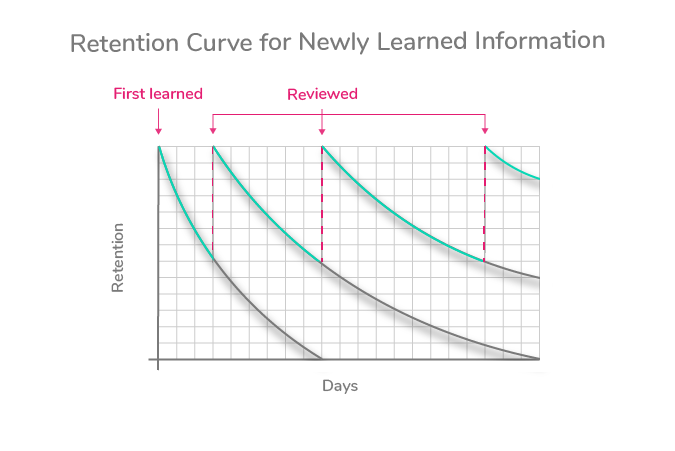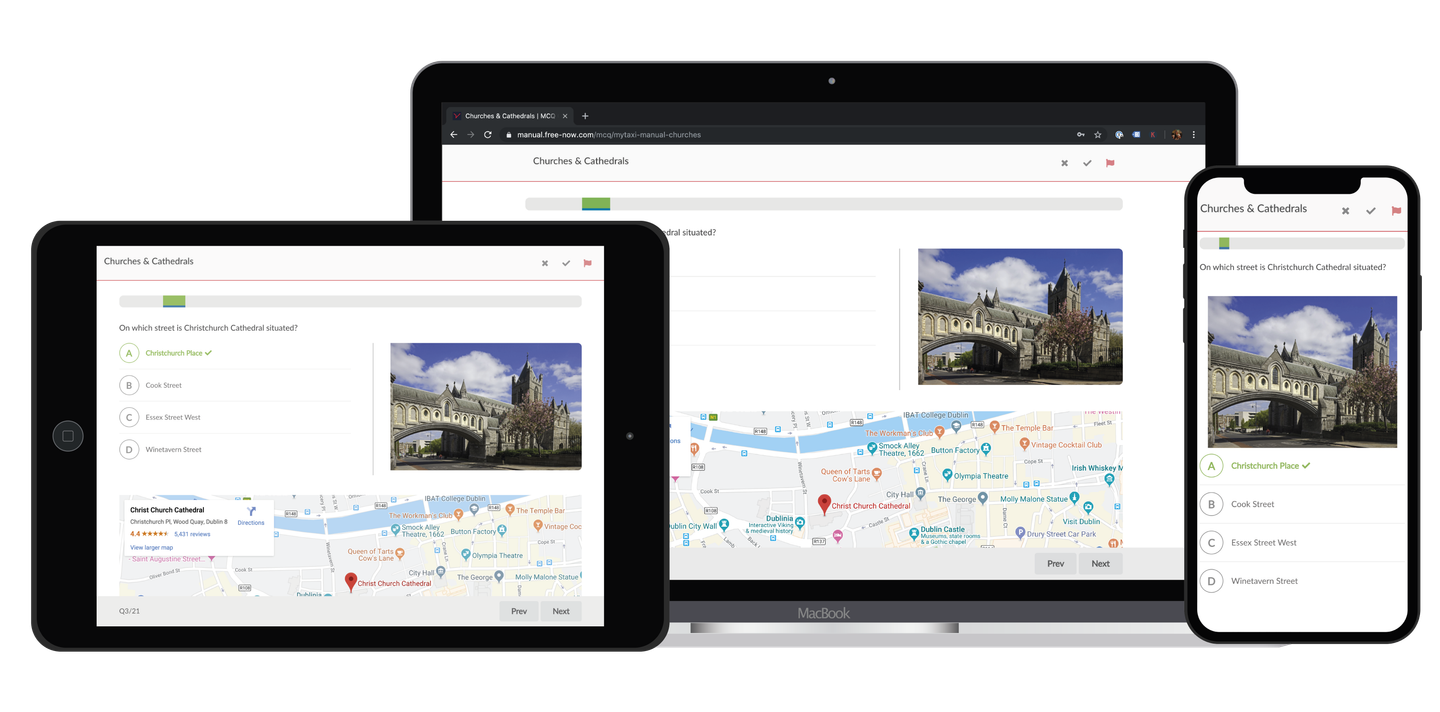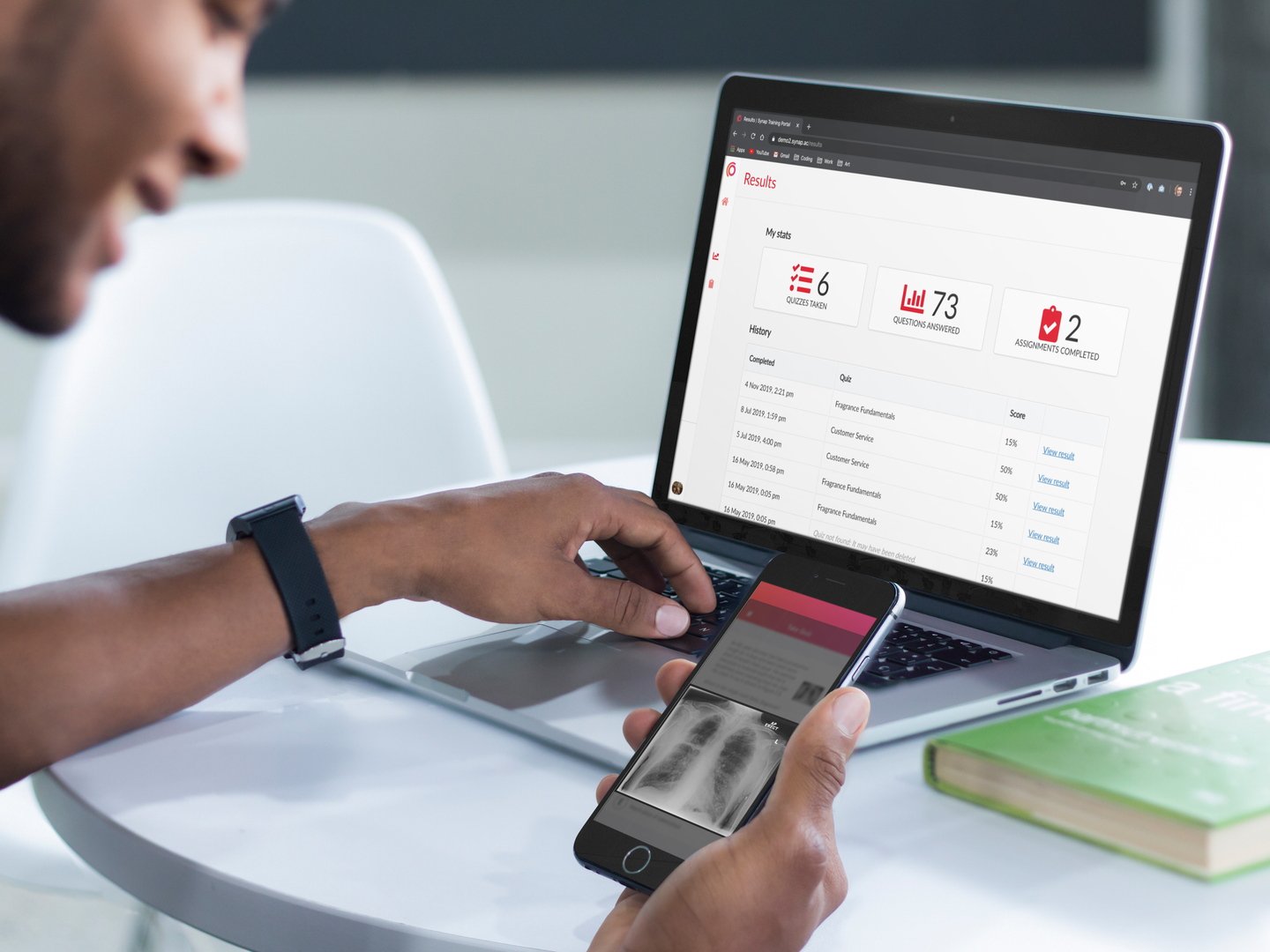It started out as a personal project and evolved into an app used by various sectors around the world. Synap’s award-winning learning platform has allowed companies and educators to transform their teaching, with it’s ability to deliver personalised, effective and engaging training at scale.
The Origins of Synap’s Platform.
Studying towards their medicine degree in 2015, our founders James and Omair found reading a text book time consuming and a largely ineffective revision method. They wanted to create a more engaging way to study to learn more in less time.
After some research into different learning models, the pair settled on the idea of studying using questions. Creating, sharing and practicing quizzes with each other challenged James and Omair to revise in a new, challenging and sociable way. Sharing this method with their peers led to a Facebook group being made, then evolved to a WordPress plugin and finally evolved into it’s own website called Synap.
Synap’s original website allowed users to create and share quizzes with their friends. Within weeks they had tens of thousands of professionals visiting the website to benefit from active learning including; doctors, lawyers, engineers, accountants, and pilots to name a few. By the time James and Omair graduated 25% of medical students in the UK were using the revision platform.
One of the most desirable aspects of the Synap app is the Spaced Learning feature. It is based on Bjork’s Spaced Repetition theory that states reviewing information at regular intervals greatly improves the amount of knowledge that is retained in long-term memory. With Spaced Repetition, you can gradually increase the length of these intervals so that you’re effectively ‘testing’ your memory at each review point. Forcing your memory to work hard triggers the formation of new neural pathways so that retrieval will be easier in future.
 Over the past few years Synap has transformed from a B2C into a B2B company. The focus is now on creating a customisable platform for business’ and institutions to use and see visible results. So how has Synap’s LMS successfully been implemented?
Over the past few years Synap has transformed from a B2C into a B2B company. The focus is now on creating a customisable platform for business’ and institutions to use and see visible results. So how has Synap’s LMS successfully been implemented?
Increasing FreeNow’s Driver Workforce in Ireland.
FreeNow is one of the leading taxi companies in Europe. To become a certified driver the trainees must first pass an extensive industry and area knowledge test including roads, street names, landmarks, routes and diversions. With over 18,000 roads in Dublin there’s a lot of information to take in!

The challenge
With the exam being so demanding, FreeNow wanted a platform that would let drivers practice between jobs. They required valuable insights into which drivers were ready for the test and who needed additional help.
What we did
We developed a platform alongside FreeNow to create their vision. The FREE NOW Manual is able to embed Google Street view images and Google Maps content into the questions, providing visual context for the drivers preparing for their exam.
We also enabled a feedback and flagging system. This allowed for users to raise any questions that they have seen on the test but not yet seen in the manual, maintaining the relevance of the content.
Custom reports were made for each user based on their results, allowing FreeNow administrators to monitor progress and quickly identify when users were ready to sit the test.

The results
The use of our Spaced Learning and the ability to track progress has attracted **10,000 users each month.**The use of Synap has also seen the companies first time pass rate increase significantly from only 20% to a tremendous 80%
“If you’re serious about passing the test, the FreeNow Manual is absolutely perfect. It’s easy to use and understand and helps you study with purpose. I failed the exam 3 times and then started using it and passed after a few weeks! It was invaluable.” - Tommy, Certified Freenow Driver
Collaboration and Custom Diagnostic Tools; Scaling PurpleBee's Business Online
PurpleBee are a chain of award-winning nurseries in Cambridge. Linda (CEO of PurpleBee) realised the secret to their success was how they trained their staff and the programmes that they offered. They were soon looking for a way to scale their training without losing it's quality.

The challenge
A key part of PurpleBee’s training methods are customising learning to each individual. For face-to-face training this is easy. You can simply ask the individual what areas they’d like to focus on to set them the relevant assignment. But translating this to an online platform meant we needed a tool that would ask people questions and organise them based on their response.
What we did
To tailor the learning to each individual we created a tool that allows users to self-assess and choose the areas they want to focus on. We built this functionality into the platform to keep the process as seamless as possible for the learner. The end result is a built-in diagnostics tool that sorts users into the right learning paths. We also created an integrated eCommerce store allowing PurpleBee to reach a wider market both nationally and internationally. They now sell more of their training online, directly to learners and institutions.
The results
"As a startup company, having Synap as our tech partners has been invaluable in helping us to create an online learning environment that is both innovative and agile. They continue to be incredibly supportive as we continue to develop and grow." - Linda Baston-Pitt, CEO of PurpleBee Learning
30% Score Improvements in Medical Education
Synap has a long-term partnership with Oxford University Press (OUP) and is now also partnered with the Medical Defence Union (MDU). Synap offers professional online learning content to students and doctors from OUP’s famous Clinical Handbooks. As Synap is well established with members of the medical community it was the perfect opportunity to partner and provide medical students and doctors a study platform filled with content from Oxford University Press.

The challenge
To create an engaging learning platform to help medical students learn more in less time.
What we did
We have worked closely with the MDU to set up the platform. As part of our on-boarding we assisted in creating marketing materials, presentations and attended events to inform students and doctors about the platform. Using custom groups, students and doctors can register through the MDU website. Their Synap account are generated automatically to reduce friction. Once registered, users are able to access the app through iOS and Android as well as online. Our intelligent Spaced Learning algorithm informs users of the topics that require the most improvement. Users receive daily push notifications when their personalised quizzes have been generated to improve those areas. By providing content through a mobile platform, MDU has made revision more accessible and active for their students.
The results
**1 in 4 medical students now choose to use Synap and OUP’s handbooks to study for their exams. Over 100 million questions have been answered by students and professionals. In an analysis of results from students using Synap in Brighton and Sussex Medical School, we found that users who follow the recommendations of our Spaced Learning algorithm benefited from a 30% score increase That could be the difference between a C grade and an A grade.
“The Synap team have been extraordinarily helpful with every step of the process. They helped with item uploading, engagement data gathering, and even structuring a separate private environment reserved for my students. I know more about how my students, on average, use the excellent system. This is helping us to move forward with both educational best practice and educational research publications.” - Harry Witchell, Professor of Physiology.
Preparing Law Students for the Solicitors Qualifying Exam with our LMS.
The University of Law is the leading provider of undergraduate legal education in the UK with 10 campuses. They are now using Synap to deliver a new range of blended and fully digitalised courses for the Solicitors Qualifying Exam(SQE).
The challenge
By 2021 the Solicitors Regulation Authority (SRA) will have made significant changes to the way in which solicitors will qualify in England and Wales. The introduction of the SQE exams means that every aspiring solicitor will now sit the same test, regardless of how or where they studied. ULaw have designed a new range of courses to help individuals prepare for the SEQ and wanted an accessible platform that would enable them to deliver at scale. They also wanted a way of enhancing pass rates for the SEQ.
What we did
We started off as a pilot programme for the university to gain feedback on what features students found beneficial. After the pilot we tweaked the platform, taking on board suggestions for improvement from both students and teachers. Questions banks were made easily accessible to students and admins, making sure that images and text formatting were supported. Administrators are able to upload questions in bulk and our built-in flagging system allows for the questions to be updated to maintain accuracy.
The results
We have received some extremely positive feedback from students and teachers. Particularly about providing valuable insights into how and when their students revise. The ability to measure progress through learner analytics was also well-received. The figures don’t lie - 10,000 students across 10 campuses are using Synap to prepare for their exams. We have been able to integrate our system seamlessly with the universities existing LMS. It was a necessity that students could use their existing log-on to access their Synap content.
“The University is delighted to announce Synap as our exclusive partner in providing the online learning platform for the SQE 1 assessment and our new BPC programme. Innovation for the improvement of learning is central to ULaw’s ethos and our students expect the best and latest tools, such as Synap, to enable them to achieve their goals” - Professor Andrea Nollent, Vice-Chancellor and CEO at ULaw
Benefits of e-Learning for Training and Development.
It’s not surprising to learn that the e-learning market is projected to reach over $242.7 Billion by the year 2025. As you can see from our case-studies there are many reasons for the popularity of online learning increasing… Scalability, learning more in less time, increasing retention rates and providing accessible resources are all very good reasons you should be using an LMS within your organisation.
